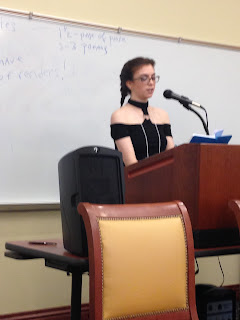Call for Papers for WVU EGSU Conference 2017
Finding Frontiers: Then, Now, and Beyond
Keynote speaker: Professor Holly Dugan, George Washington University
In 1893 at the World’s Columbian Exposition in Chicago, Frederick Jackson Turner declared that “[by] moving westward, the frontier became more and more American…each frontier leaves its traces behind it, and when it becomes a settled area the region still partakes of the frontier characteristics.” For Turner, the frontier and the American pursuit of the ever shifting frontier line was the force that shaped our democracy. It left upon future generations a temporal residue that found its way onto coming frontier lines, and the future definitions that came out of them Where, then, is the frontier now? How do we identify it if/when we find it? Turner’s declaration, and the questions it elicits, recall parallel issues of space across ages, disciplines, and texts.
The students of the English Graduate Student Union (EGSU) at the West Virginia University Department of English invite you to explore the idea of frontiers and the complications that they entail. The conference this year will be titled Frontiers: Then, Now, and Beyond, and will be held March 11th, 2017 at the West Virginia University downtown campus in Colson Hall.
This interdisciplinary conference seeks to look further at the unexplored, undefined, indefinite nature of frontiers like those that Turner describes in his thesis. Presenters should feel free to explore the idea of frontiers in some of its broadest terms. Guiding questions include: what are the implications of imagined borders within the frontier narratives of 19th century America? How do literary borders situate, sustain, and undermine the British empire during the same period–and where do we find additional historic, scientific, and cultural parallels? How does the rise of post-apocalyptic fiction in popular culture speak to the constant search for new frontiers? How does the proposed Anthropocene affect the drawing back or expansion of sensual or ecological frontiers? We urge you to broadly explore all questions of, or pertaining to, frontiers. You may consider one of, but are not limited to, the following categories:
- Ecocriticism and Environmental Studies
- African American Literature
- Women, Gender, and Sexuality
- Popular Culture
- Liminality
- Posthumanism
- American Literature
- British Literature
- Transatlantic Studies
- Hemispheric Studies
- Hispanic, Latino/a, and Chicano/a Literature
- Native American Literature
- Postcolonial Literature
- War and/or Trauma and Literature
- Film Studies and Film Theory
- Queer Theory
- Critical Theory and Aesthetics
- Architecture and Urban Planning
- Digital Humanities
Creative writing panels are also encouraged. Possible panel topics for creative writers might include defying boundaries of genre and/or genre blending, the resurgence of fairy tales in contemporary creative writing, or influences on your work out of genre or that deal in any of the possible subjects listed above. Fiction, creative nonfiction, and poetry panels should plan to read for 7-10 minutes per participant and field questions from their audience.
More information can be found at https://wvuegsuconference.wordpress.com/.


































